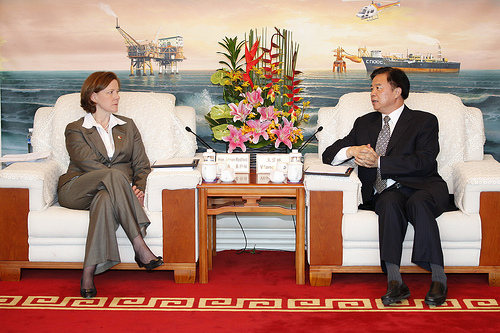Change the conversation, support rabble.ca today.
Stephen Harper has announced Canada will approve the sale of energy giant Nexen to a Chinese state-owned oil company, CNOOC. Also Harper allowed Malaysia’s national oil company Petronas to buy Progress Energy Resources, a purchase that will accelerate production and export of shale gas from Northern B.C.
The prime minister was clearly irritated: “To be blunt, Canadians have not spent years reducing the ownership of sectors of the economy by our own governments, only to see them bought and controlled by foreign governments instead.” He added that, from now on, only under “exceptional circumstances” would additional Canadian bitumen sands assets be approved for sale to foreign state interests.
To show Canada was still “open for business,” Harper announced the threshold for private sector foreign takeovers — without review by the Canadian government — would be raised to $1 billion. The former limit of $330 million would still apply to state-owned enterprises.
While Nexen started life as the subsidiary of Occidental Petroleum (Oxy), an American company, Canadian Oxy acquired SaskOil, the company started by the NDP under Allan Blakeney, when it was privatized by the Devine Conservatives. The sale of SaskOil, like the divestment by the federal government of Petro-Canada, was done without much thought to the long-term cost of the sale of a strategic asset.
In 2000, the former SaskOil (renamed Wascana) merged with Canadian Oxy assets and became Nexen. CNOOC offered a 61 per cent premium to acquire Nexen which had become widely held, with financial institutions and pension funds taking a large ownership role, and happy to sell out for a one-time profit.
What Harper fails to understand is that state strategy is a key element in promoting economic advantages, China being a case in point. While the second largest takeover in Canadian history, the $15-billion Nexen purchase is a small part of a well thought-out Chinese strategy to turn its over $3 trillion in foreign exchange reserves (largely in U.S. government securities) into tangible assets.
As the second largest energy consumer in the world, China is investing widely in oil and gas through three state-owned oil companies (Sinopac, Petro-China and Concooco). It has an energy strategy that includes dominating production of solar panels, importing coal and importing Liquid Natural Gas, as well as taking positions in oil and gas plays in Africa, Latin America, Asia and the Middle East.
Unlike Canada, China has a climate change strategy: having the advanced nations reduce greenhouse gas emissions more rapidly than newly industrializing nations. This Kyoto approach — Canada pulled out of the international agreement — was just re-confirmed in the climate talks in Doha.
Chinese oil companies have a strategy of diversifying sources of energy. Geographically, Chinese companies operated in countries viewed suspiciously by the U.S. (including under American boycott, military threat, or subject to military action) such as Iran, Sudan, Libya and Venezuela.
The Nexen purchase is part of the Chinese decision to take positions in North America. In Maclean’s, specialist Debra Steger listed major Chinese investments. “In 2011, CNOOC made a major move into the oil sands by purchasing 100 per cent of OPTI Canada for $2.1 billion. Sinopec acquired Daylight Energy in 2011, and made a $4.65 billion investment in Syncrude in April 2010. China Investment Corporation (CIC), a sovereign wealth fund with an office in Toronto, made an investment of $817 million in a new oil sands joint venture with Penn West Energy Trust in May 2010; it also made a $1.5 billion investment in Canadian mining company, Teck Resources, in 2009. Petro China invested $1.9 billion in Athabasca Oil Sands Corp. in late 2009.”
In contrast to China, Canada has no energy strategy (equally, oil-rich Alberta has no energy strategy). Harper does not like state enterprises. His own interpretation is that “Canada has decided to have a free market economy,” which is simply not true. From the time of French colonization until today, Canada has had a mixed economy, with a significant role for the state. This is especially true of his own government. Its jets-and-prisons approach to the economy may not make strategic sense, but it requires a strong state.
By owning Nexen, China takes control of the bitumen property known as Long Lake, but there is more to the deal than Alberta sands. Nexen has properties outside North America in West Africa, Poland, Yemen and Colombia. It has technical skills in offshore drilling developed through its holdings in the Gulf of Mexico and the North Sea. It seems likely that Nexen technology and knowledge will be deployed by its new owners for off-shore drilling in the China sea. As one of three state oil companies, CNOOC’s first mandate was to specialize in offshore oil and gas.
While China plays chess, Harper plays checkers, putting his faith in a one-side foreign investment agreement signed with China, the badly flawed Foreign Investment Promotion and Protection Agreement (FIPA). This still-secret deal will protect Chinese bitumen holdings, and block future initiatives by Canadian governments to have raw bitumen upgraded in Canada. FIPA makes strategic sense for China, but as President Gil McGowan of the Alberta Federation of Labour points out, it means giving up control over strategic assets, and denying potential economic advantages to Albertans and other Canadians.
Duncan Cameron is the president of rabble.ca and writes a weekly column on politics and current affairs.
Photo: PremierofAlberta/Flickr



